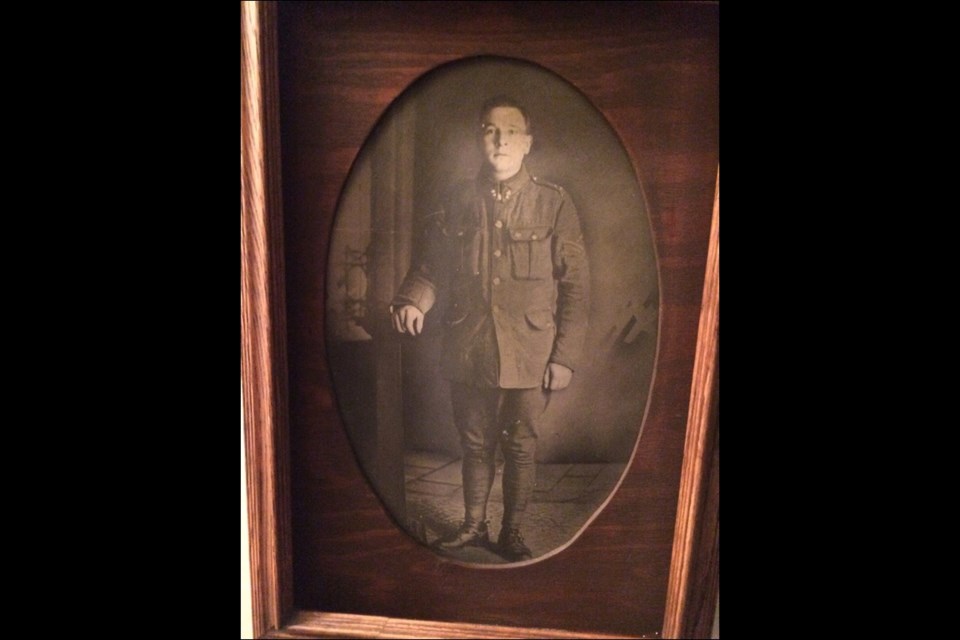When shots rang out to mark the start of the First World War a century ago, Flin Flon was still a flight of fancy among prospectors.
But while Flin Flon was not around to contribute to the campaign, there is little doubt that the Great War – and the heroes it produced – helped shape the community.
Surprisingly little is known about Flin Flon’s connection to the First World War.
Part of the reason is that early record keeping in the community was spotty. Another factor is that nine years passed between the end of the war and the incorporation of HBM&S in what would become Flin Flon.
Perhaps the most significant element is the fact that the men (and women) who served Canada in the four-year war often remained silent and humble upon their return.
Fit description
Daniel Meikle Bryson, an early resident of Flin Flon, certainly fit that description, recalls his daughter, Ethelyn Nystrom.
“I just remember him saying to my brother one time – my brother was learning In Flanders Fields – and my dad said, ‘Yeah, and when I was there it was a bloody, muddy mess,’” says Nystrom, Bryson’s daughter. “So whether he was there as a soldier, I would assume so, but that’s basically all I ever knew.”
What is known is that Bryson was born on Nov. 2, 1894 (enlistment records incorrectly identify the year as 1895) in Scotland, moving to Canada as a teenager.
When Bryson’s adopted country called him to serve, he didn’t hesitate. A sergeant with the now-defunct Winnipeg Grenadiers, he was a gunner in the war, though Nystrom isn’t sure where or for how long he fought.
At 24, Bryson was still a young man when the war came to a merciful end. Back on friendly soil, he tried his hand at farming near Swan River but lost everything in the Dirty Thirties.
Down but not out, Bryson moved north to work at the Gurney gold mine near Cranberry Portage. He evidently relocated to Flin Flon after the mine ended its brief run in 1939.
Felt at home
In the fledgling, rough-and-tumble mining town, Bryson felt at home. For years he worked as a watchman at HBM&S, now Hudbay, earning a good living for a family that included five children.
Though Bryson’s boyish eyes conveyed a certain innocence, beneath the surface it was clear he was scarred from what still stands as Canada’s deadliest battle.
“There was no help for [returning veterans],” says Nystrom. “My mom said he had nightmares for years and years and years after, but he never dealt with it all during the day or anything like that. He just got on with life.”
By the time Bryson moved to Flin Flon, the community had a flourishing Legion branch that celebrated veterans and gave them a place to share their experiences with understanding friends.
Though he paid his membership dues, Bryson never really got involved with the Legion.
“I think it just maybe brought back too much,” says Nystrom.
So eager was Bryson to forget his military past that he burned his discharge papers and said his medals meant nothing to him.
Years later, when a family member wanted to reorder the medals, Bryson’s answer was succinct: “Forget it.”
Though disinterested in the Legion, one of Bryson’s good friends was a Legionnaire (and fellow Scotsman) by the name of Bobbie Bryson.
“I don’t think they talked about war at all, but they talked lots about Scotland,” recalls Nystrom, adding that by the time the pair ended a conversation, the Scottish brogue was being laid on especially thick.
Retirement
After retiring from HBM&S, Bryson decided to stay in Flin Flon, a community he deeply cherished. He was in his early 80s when he died of cancer in 1975.
Other than her father’s comment about being at Flanders Fields in Belgium, Nystrom has precious few tidbits about his First World War service.
He once told her there was a time during the war he was so cold that he never thought he would be warm again. On another occasion, Nystrom’s nephew asked his grandfather whether he had killed anyone in battle.
“He just said, ‘Absolutely not,’” says Nystrom. “But he probably did. He was a gunner, as far as I knew.”
Saddened
With Canada this year marking the 100th anniversary of the start of the Great War, Nystrom is saddened that she will never know the full story of her father’s contribution.
“I’m really curious now, but too little, too late,” she says. “But, you know, as a kid, no, [I was] not really [interested]. We all knew [he was in the war] but he just shut you down any time you tried to talk about it at all.”
At 64, Nystrom, who moved from Flin Flon to BC several years ago, is uncommonly young to be the child of a First World War veteran. Her father was in his 50s when she was born.
Her mother, Anne Bryson, passed away in 2006. Brothers Jim, Donald and George are also deceased, leaving Nystrom and sister Lorna Herbel as the surviving children.
Though Nystrom has few accounts of her father’s heroics in the First World War, she knows he is fondly remembered for other reasons.
“He could be gruff, but everybody really did like him,” she says. “He was a great neighbour and a great friend.”




